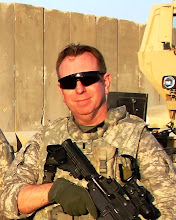Twenty years ago today, the Iraqi Army rolled seven hundred tanks south across the Kuwaiti border and conquered the small Gulf state in two days. A few days later, the United States led a coalition force into Saudi Arabia and launched Operation Desert Storm in January 1991. The longest air strike in the history of aerial warfare was followed by an impressive land invasion that pushed the Iraqi forces back across the border in just under one hundred hours. U.S. forces remained in Saudi Arabia and Kuwait in an effort to maintain the peace and stability of the region.
This U.S. presence in "The Kingdom" raised the ire of a young and rich Saudi who had funding Mujaheddin fighters in Afghanistan and had helped them (with a little help from the United States Special Forces and CIA operatives) push the Soviet Union back across their own border. The Soviets had invaded Afghanistan a decade earlier. As a part of his efforts in Afghanistan and Pakistan, Bin Laden formed an Islamic militant organization called Al Qaeda. Following the war, Al Qaeda sought to move elsewhere around the globe to bring Jihad against the enemies of Islam. At the time of the Iraqi invasion of Kuwait, Bin Laden - then living in Saudi Arabia again - offered the assistance of his army of Mujaheddin fighters to defeat Saddam Hussein's forces. The Saudi leader, King Fahd, declined the offer, preferring to allow the American-led coalition take the lead.
This angered Bin Laden. Aside from the perceived dismissal at the hands of his king, Bin Laden hated the idea of Western infidels living as guests on Saudi Arabian soil. He saw the American presence as disgracing the sacred soil of Saudi Arabia - the land of the two mosques. His outspoken protests resulted in Bin Laden's banishment from the kingdom.
He set up shop in the Sudan and, later, back in Afghanistan. He directed the efforts of Al Qaeda in the 1990s against the United States and its interests abroad. The 1993 World Trade Center bombings, the 1998 bombings of the United States embassies in Tanzania and Kenya, the 2000 bombing of the USS Cole, and, finally, the attacks of September 11, 2001 in New York City and Washington, D.C.
Of course, the September 11th attacks resulted in the United States initiating the invasion of Afghanistan in October 2001 and the Global War on Terror. By extension, the Bush administration initiated the March 2003 invasion of Iraq in which Saddam Hussein was driven from power and subsequently captured, tried, and executed.
Today, twenty years to the day after those first Iraqi tanks rolled across the Kuwaiti border, I sit here deployed not fifteen miles from where they crossed. I remember walking into work on August 2, 1990. My friend, Wes, asked me if I had seen the news. He proceeded to inform me that "the Middle East just exploded." He added that our world would never be the same. Standing there in a the hallway of a suburban police station, I doubt either of us understood just how right he was in his assessment of what had happened that morning.
Monday, August 2, 2010
Subscribe to:
Posts (Atom)




